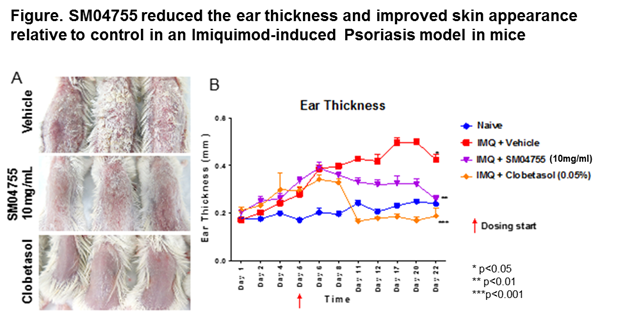Session Information
Date: Tuesday, November 15, 2016
Title: Spondylarthropathies Psoriatic Arthritis – Pathogenesis, Etiology - Poster II
Session Type: ACR Poster Session C
Session Time: 9:00AM-11:00AM
Background/Purpose: Psoriasis is an auto-immune disease of the skin, characterized by inflammation and fibrosis producing patches of red, itchy and scaly skin. Wnt signaling plays an important role in psoriasis by regulating inflammation, keratinocyte proliferation and dermal fibrosis. SM04755, a novel, topical small-molecule Wnt pathway inhibitor was evaluated in a series of preclinical studies to determine its potential to inhibit inflammation, keratinocyte proliferation and dermal fibrosis, thereby improving skin health in psoriasis.
Methods: Wnt pathway inhibition was measured using a cell-based reporter assay. Anti-inflammatory activity was evaluated by ELISA measuring TNF-α and IL-6 secretion in THP-1 monocytes stimulated with Lipopolysaccharides (LPS) and PBMCs stimulated with anti-CD3/anti-CD28. Cytokine induced keratinocyte proliferation was measured in HaCaT cells using an EdU incorporation assay. The effect on fibrosis was assessed in TGF-β stimulated human dermal fibroblasts by measuring smooth muscle actin (αSMA), plasminogen activator inhibitor (PAI-1), connective tissue growth factor (CTGF) and collagen expression by qPCR. Pharmacokinetics were evaluated by topical application in rats and mini-pigs, followed by analysis of compound concentrations in skin and plasma. In vivo efficacy was evaluated in an Imiquimod-induced mouse psoriasis model by measuring skin and ear thickness, spleen size and weight, ex vivo T cell activation and proliferation, and cytokine levels in plasma.
Results: SM04755 demonstrated potent (EC50 =152nM) and selective inhibition of Wnt signaling. SM04755 inhibited LPS- and anti-CD3/anti-CD28-induced TNF-α and IL-6 secretion (EC50 =500nM) in THP-1 cells and PBMCs. SM04755 inhibited cytokine induced keratinocyte proliferation (EC50 @900nM) and TGF-β stimulated dermal fibrosis as measured by a decrease (p<0.05) in gene expression of αSMA (EC50 =400nM), PAI-1, CTGF, and collagen in human dermal fibroblasts. Single topical application of SM04755 resulted in skin concentrations >EC50 for >24hrs, with minimal systemic exposure or toxicity. In the Imiquimod-induced mouse psoriasis model, topical SM04755 significantly (p<0.01) decreased skin and ear thickness, improved skin appearance, and significantly (p<0.01) reduced spleen size and weight as compared to vehicle. Clobetasol, a positive control, decreased skin thickness (p<0.001) below that of normal skin (a known adverse effect of steroid treatment). Ex vivo T cell activation, proliferation, and cytokine secretion were inhibited with SM04755 treatment compared to vehicle.
Conclusion: In a mouse model of Imiquimod-induced psoriasis, topically applied SM04755 inhibited inflammation, and decreased skin thickness compared to vehicle, with minimal plasma exposure or systemic toxicity. SM04755 has potential as a topical therapy for psoriasis.
To cite this abstract in AMA style:
Deshmukh V, Pedraza M, Ibanez M, Dellamary L, Stewart J, Seo T, Melchior B, Hood J, Yazici Y. Discovery of a Small Molecule Inhibitor of the Wnt Pathway (SM04755) As a Potential Topical Treatment for Psoriasis [abstract]. Arthritis Rheumatol. 2016; 68 (suppl 10). https://acrabstracts.org/abstract/discovery-of-a-small-molecule-inhibitor-of-the-wnt-pathway-sm04755-as-a-potential-topical-treatment-for-psoriasis/. Accessed .« Back to 2016 ACR/ARHP Annual Meeting
ACR Meeting Abstracts - https://acrabstracts.org/abstract/discovery-of-a-small-molecule-inhibitor-of-the-wnt-pathway-sm04755-as-a-potential-topical-treatment-for-psoriasis/

